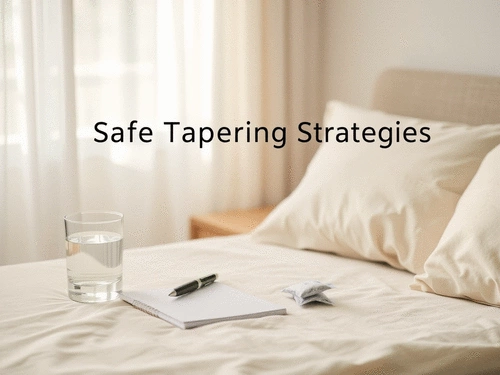Have you found yourself dependent on sleeping pills, only to realize that stopping them suddenly can lead to a difficult journey? Understanding the importance of tapering off these medications is crucial for your sleep health. Let's explore the key insights on how to manage this process effectively.
What You Will Learn
- Sudden discontinuation of sleeping pills can cause increased anxiety and severe withdrawal symptoms.
- Rebound insomnia is a common risk when stopping medication too quickly, potentially worsening sleep issues.
- Gradual tapering allows your body to adjust, minimizing withdrawal effects and maintaining sleep quality.
- Consulting a healthcare provider is essential for creating a personalized tapering schedule tailored to your needs.
- Tapering schedules vary by medication type; understanding specific strategies can aid in a smoother transition.
- Incorporating relaxation techniques and alternative therapies can further support your journey to better sleep.
The Journey to Tapering Off Sleeping Pills
A visual guide to understanding the distinct tapering schedules for various sleep medications, highlighting the gradual reduction process.
Benzodiazepines
These require a very slow reduction due to their strong dependency potential.
Z-drugs (e.g., Zolpidem)
Often allow for a slightly faster, but still cautious, reduction.
Over-the-counter Sleep Aids
Generally less potent, allowing for a more flexible tapering.
Importance of Medical Guidance
Always consult a healthcare provider for a personalized and safe tapering plan.
Understanding the Need for Gradual Tapering of Sleeping Pills
Have you ever found yourself relying on sleeping pills to drift off at night? You're not alone! While these medications can offer temporary relief, stopping them abruptly can lead to some serious issues. Sudden discontinuation can result in heightened anxiety, panic attacks, and even severe withdrawal symptoms, as detailed by the National Center for Biotechnology Information (NCBI). It's vital to understand why a gradual tapering process is so important when it comes to discontinuing sleeping pills.

Additionally, many individuals experience rebound insomnia, where sleep issues return even stronger than before if they stop taking their medication too quickly. This can create a frustrating cycle of sleeplessness that is hard to break. Understanding the risks associated with a sudden stop is the first step toward safer and more effective sleep management.
The Risks of Abrupt Discontinuation
- Increased anxiety and irritability
- Severe withdrawal symptoms such as nausea and seizures
- Heightened risk of rebound insomnia
- Potential for sleep disruptions to become chronic
As someone who is passionate about sleep health, I often see how these risks can take a toll on individuals. It’s crucial to recognize that abruptly stopping sleeping pills can throw your body off balance, making it harder to achieve the restful nights we all crave.
Why Gradual Reduction is Crucial for Safe Tapering
Gradual tapering minimizes the chances of experiencing those unwanted withdrawal symptoms. By slowly reducing the dosage, your body has the opportunity to adjust, making the transition smoother. Creating a personalized tapering schedule with the guidance of a healthcare provider can make a world of difference in your journey to better sleep.
Moreover, a structured tapering plan helps maintain sleep quality throughout the process. This ensures that you’re not only reducing reliance on medication but also fostering the natural sleep patterns your body craves. Remember, it’s not just about stopping the pills; it’s about finding a healthier way to sleep.
Creating Your Personalized Tapering Plan
Collaborating with Healthcare Providers for Tailored Guidance
Before diving into a tapering plan, it's essential to consult with a healthcare provider. Their expertise can guide you in developing a plan that suits your unique needs. A professional can help you understand how to taper safely, taking into consideration your medical history, current medication, and any underlying sleep disorders, as highlighted in considerations for pharmacological treatments for insomnia.
Working with a healthcare professional not only ensures that you're on the right track but also provides you with support during this challenging time. Knowing that you have someone by your side can be incredibly empowering.
Step-by-Step Tapering Schedules for Different Medications
Every medication is different, and so are the tapering plans associated with them. Here’s a brief overview of how tapering schedules might look for various classes of sleep medications:
- Benzodiazepines: Taper by 10-25% every 1-2 weeks.
- Z-drugs: Reduce dosage by 25% every 2-4 weeks.
- Over-the-counter sleep aids: Gradually decrease frequency or dosage over several weeks.
These templates can serve as a guiding framework. However, it’s essential to work with your healthcare provider to customize a tapering schedule that aligns with your body’s response and needs.
Understanding Dosage Reduction Strategies
Effective tapering is not just about reducing the dosage; it’s about doing so in a way that maintains your sleep quality. One popular strategy is to reduce your dosage by the smallest possible increments; this can help your body adjust without overwhelming it. Consultation with your doctor can help determine how much to reduce based on your specific situation.
Incorporating relaxation techniques and alternative therapies during this process can also support your sleep journey. Remember, the goal is to create a nurturing sleep environment as you move away from medication dependence.
Pro Tip
To enhance your tapering journey, consider integrating relaxation techniques such as deep breathing exercises or gentle yoga into your daily routine. These practices can help mitigate withdrawal symptoms and improve your overall sleep quality, making your transition away from sleeping pills smoother and more manageable.
Reinforcing the Importance of Medical Guidance
When it comes to tapering off sleeping pills, medical supervision is not just helpful—it's essential. Stopping medication abruptly can lead to a host of complications, making the journey much more difficult. I can’t stress enough how important it is to have a healthcare provider by your side, guiding you through this complex process. Without professional support, many individuals may resort to self-medication, which can increase the risk of adverse effects and prolong dependency.

As you consider tapering, remember that a tailored approach is key. Your unique situation, including your medication type and personal health history, should dictate your tapering strategy. This is where your healthcare provider becomes invaluable.
Benefits of Professional Support in Managing Sleep Disorders
Working with sleep specialists and support groups provides numerous advantages. Here are some of the key benefits:
- Personalized Guidance: Professionals can help create a tapering schedule that aligns with your specific needs.
- Emotional Support: Sharing experiences with others in support groups can boost morale and reduce feelings of isolation.
- Access to Resources: Specialists can provide you with tools and information about alternative therapies and lifestyle modifications.
Having a support system can make all the difference in your tapering journey. I’ve seen firsthand how individuals thrive when they feel understood and supported by both professionals and their peers.
Empowering Your Journey Towards Better Sleep
As you embark on this path toward tapering, approach it with knowledge, support, and a proactive mindset. Remember, recovery is possible, and every small step you take brings you closer to achieving the restful sleep you deserve. I encourage you to stay informed and be gentle with yourself during this process.
Additional Resources and Support Networks
Here are some valuable resources you can utilize as you work toward better sleep:
These organizations offer a wealth of information, support groups, and forums where you can connect with others who are also on their sleep improvement journey.
Incorporating Sleep Hygiene and Mindfulness Practices
To enhance your sleep quality, consider incorporating sleep hygiene and mindfulness practices into your daily routine. Here are some techniques to explore:
- Consistent Sleep Schedule: Go to bed and wake up at the same time every day to regulate your body’s internal clock.
- Mindfulness Meditation: Take a few minutes each day to practice mindfulness, helping to calm your mind before bed.
- Relaxation Techniques: Engage in deep breathing or gentle yoga to reduce stress and prepare your body for sleep.
Improving your sleep hygiene and practicing mindfulness can significantly support your journey toward better sleep, complementing the tapering process. I invite you to explore these methods and find what resonates with you!
Frequently Asked Questions (FAQs)
- Q: Why is gradual tapering essential when stopping sleeping pills?
- A: Gradual tapering is crucial to prevent severe withdrawal symptoms, heightened anxiety, and rebound insomnia that can occur with sudden discontinuation. It allows your body to adjust slowly.
- Q: What are the main risks of stopping sleeping pills abruptly?
- A: Abrupt cessation can lead to increased anxiety, irritability, severe withdrawal symptoms (like nausea and seizures), and a higher risk of rebound insomnia, potentially making sleep issues chronic.
- Q: How do tapering schedules differ for various types of sleeping pills?
- A: Tapering schedules vary by medication. For example, benzodiazepines may require a 10-25% reduction every 1-2 weeks, while Z-drugs might involve a 25% reduction every 2-4 weeks. Over-the-counter aids can be decreased more flexibly.
- Q: Why is medical guidance important during the tapering process?
- A: Medical supervision is essential for creating a personalized and safe tapering plan, considering your medical history and medication type. Healthcare providers offer support, manage potential complications, and provide access to helpful resources.
- Q: What complementary practices can support the tapering journey?
- A: Incorporating relaxation techniques (like deep breathing or yoga), mindfulness practices, and maintaining consistent sleep hygiene (e.g., a regular sleep schedule) can significantly support sleep quality and ease the transition away from medication.
Recap of Key Points
Here is a quick recap of the important points discussed in the article:
- Gradual tapering of sleeping pills is crucial to avoid withdrawal symptoms and rebound insomnia.
- Consulting with a healthcare provider is essential for creating a personalized tapering plan.
- Different medications require different tapering schedules; adjust based on individual needs.
- Incorporating relaxation techniques can enhance sleep quality during the tapering process.
- Professional support and guidance can significantly improve the tapering experience and outcomes.









